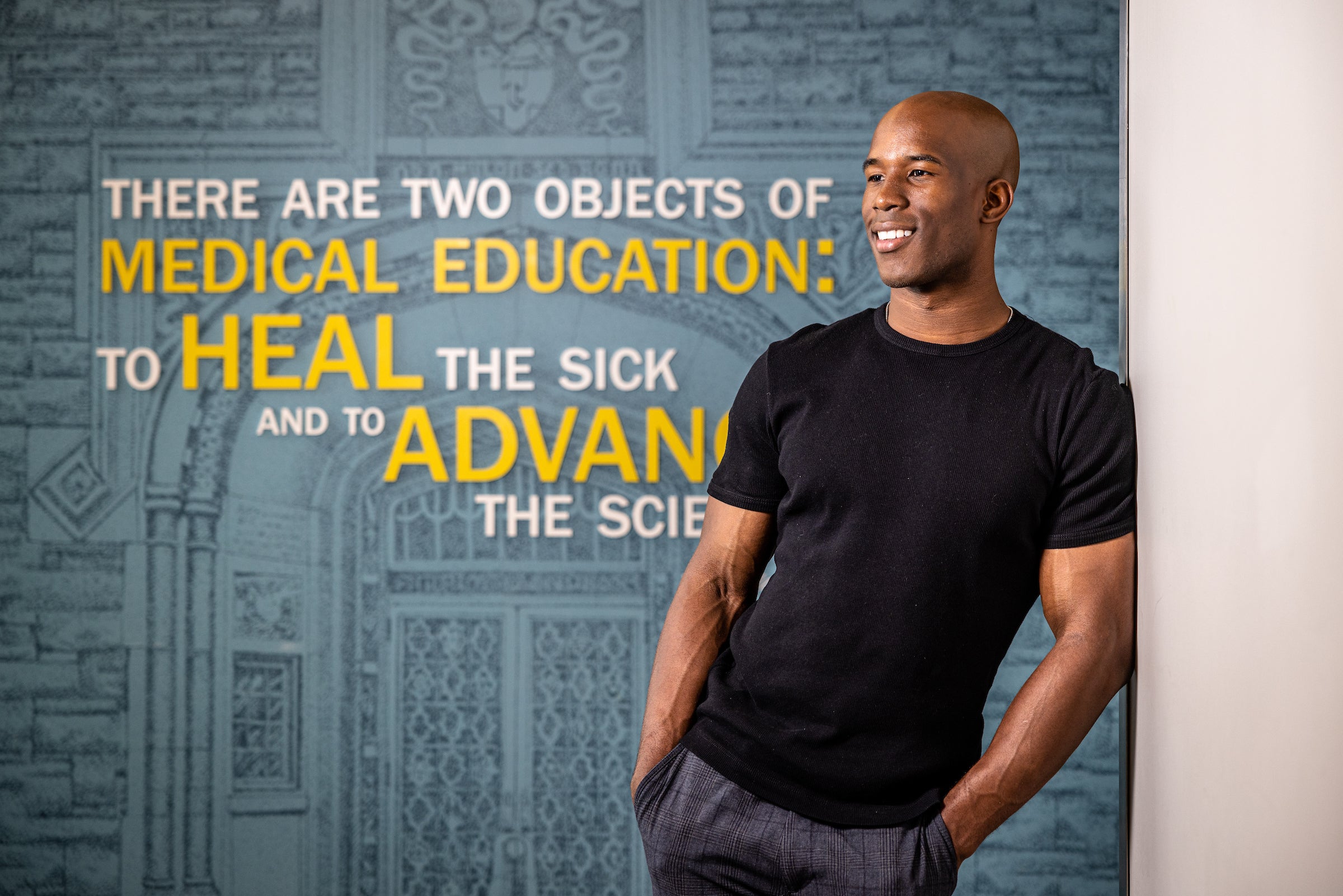Editor’s note: This story is featured in the 2022 year in review.
In August 2020, Kyle Williams was cut in training camp by the Tennessee Titans.
Williams could see it coming. He was an undrafted receiver out of Arizona State University, a longshot to make the regular-season roster.
But he was 23 years old. There would be opportunities with other teams to pursue his dreams.
Williams’ agent, Jon Baker, said he would make a few phone calls to see if other teams were interested. That’s when Williams ran a route very few 23-year-olds do.
He walked away from the game.
“Jon wanted me back in it,” Williams said, “and I literally just told him, ‘Hey, Jon, you know what? I think I’m good.’”
Williams had a different plan for his life, one that involved healing bodies instead of hurting them. He’s now a first-year medical student at Mayo Clinic Alix School of Medicine, the first step toward his goal of becoming a surgeon.
It’s a long and expensive journey: Williams said it will be at least 10 years before he gets his degree, completes his residency and is “emancipated, doing my own thing.”
“I talked to (former ASU running back and current Arizona Cardinal Eno Benjamin) when we were together at ASU, and he said, ‘Man, when my career is done, you’ll just be starting,’” Williams said.
Some waits are worth it.
“I do see myself, in whatever surgical specialty I choose, flourishing and changing lives for the better. Absolutely,” Williams said.
Williams always had an affinity for math and science, which led to him earning a biomedical engineering degree at ASU in May 2020. As to how a student-athlete can spend that much time on a field, in a playbook and still graduate with honors from Barrett, The Honors College with a 3.69 GPA, Sun Devil football coach Herm Edwards said, “He’s one of those guys that’s way ahead of the curve.”
ASU alum Kyle Williams is pictured at Mayo Clinic Alix School of Medicine in August, where he is a first-year medical student. Photo by Charlie Leight/ASU News
Williams wasn’t sure he wanted to become a surgeon, however, until he injured his AC joint in his shoulder during a game against the University of Washington his freshman season and was examined by Dr. Anikar Chhabra, the medical director for sports medicine at Mayo Clinic in Arizona and ASU’s head orthopedic surgeon since 2007.
“He gives me the diagnosis, some words of encouragement and then the prognosis and treatment,” Williams said. “And I just kind of wondered, ‘What does he do?’ Here’s this big, tall dude, and he was able to explain my pathology in a pretty concise way and communicate to me pretty efficiently.
“That was like the advent of my love for medicine. Crossing paths with Dr. Chhabra literally changed the trajectory of my life.”
Chhabra said he knew from his initial evaluation that Williams wasn’t your typical freshman athlete whose key concern is how quickly they can play again.
“He was very inquisitive about the injury,” Chhabra recalled. “’Why did this happen? How can I prevent it?’ Most football players aren’t as worried about the anatomy or physiology. His questions were more on the level of a medical student than a first-year undergrad.”
Their kinship quickly formed; Williams began shadowing Chhabra in the fall of 2017 as a research intern in orthopedic surgery. He observed shoulder and knee surgeries and watched as Chhabra interacted with patients, the nursing staff and physician assistants.
He was hooked.
“That’s when I really got gripped, if you will, by orthopedic surgery,” Williams said.
Chhabra introduced Williams to cutting-edge arthroscopic techniques and had him help write several research articles, including one on spinal injuries among football players.
“I think he’s going to be a perfect fit for academic medicine in the future,” Chhabra said.
ASU alum Kyle Williams is pictured at Mayo Clinic Alix School of Medicine in August, where he is a first-year medical student. Photo by Charlie Leight/ASU News
Although he has a natural propensity for orthopedic surgery and a desire to return to the sports arena — perhaps, he envisions, replacing Chhabra as ASU’s orthopedic surgeon — Williams has gone into medical school with an open mind.
He’s considering neurological and cardiovascular surgery. He spent about a year and a half between the NFL and medical school working as a cardiac rhythm management clinical specialist at Abbott Laboratories in Las Vegas.
Or, his practice could involve early screening and advocacy for people who are genetically susceptible to cancer. Williams’ brother, Kendall, died from colon cancer at the age of 33.
“That has given me a deeper sense of purpose while studying medicine,” Williams said. “My brother was very supportive of me in football and in my decision to quit to follow my dreams of becoming a surgeon.”
Williams does miss football, describing his permanent break with the game as a “super hard breakup.” It’s particularly trying this time of year, when teams are holding training camps and young wide receivers are catching footballs and chasing dreams.
“I mean, it’s integrated into my DNA,” Williams said. “It’s who I am. I played it for 18 years. Even today, a lot of my life resembles certain processes that I underwent in football.
“I’m used to the training table and getting food after practice. So, at Mayo, I’ll go to the cafeteria and chow down. That’s something I just can’t get rid of. And the long nights, even my mentality when it comes to grinding and studying emulates a lot of what I did in football.”
Williams has no regrets about walking away from the NFL so quickly, though. He has moved on.
“He said, ‘Look, I’m going to do this, and if I get a shot that’s great. But I’m going to have this in my back pocket,’” Edwards said about Williams. “He’s headed in the right direction.”
Top photo: Former Sun Devil wide receiver Kyle Williams is a current first-year medical student at Mayo Clinic Alix School of Medicine. After a stint as a free agent with the Tennessee Titans, he decided to forgo further adventures in the NFL to utilize his ASU biomedical engineering degree to pursue a career in surgery. Photo by Charlie Leight/ASU News
More Health and medicine

New study seeks to combat national kidney shortage, improve availability for organ transplants
Chronic kidney disease affects one in seven adults in the United States. For two in 1,000 Americans, this disease will advance to kidney failure.End-stage renal failure has two primary…

New initiative aims to make nursing degrees more accessible
Isabella Koklys is graduating in December, so she won’t be one of the students using the Edson College of Nursing and Health Innovation's mobile simulation unit that was launched Wednesday at Arizona…

Reducing waste in medical settings
Health care saves lives, but at what cost? Current health care practices might be creating a large carbon footprint, according to ASU Online student Dr. Michele Domico, who says a healthier…




